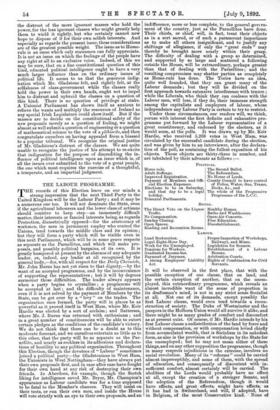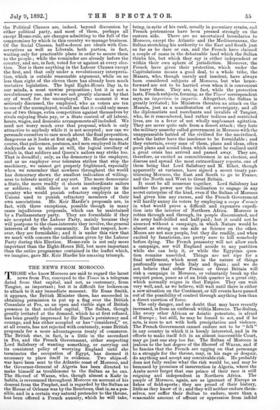THE LABOUR PROGRAMME. T HE records of this Election leave on
our minds a strong impression that the next Third Party in the United Kingdom will be the Labour Party ; and it may be a numerous one too. It will not dominate the State, even if the agricultural labourers and the lower class of artisans should contrive to keep step—an immensely difficult matter, their interests or fancied interests being, as regards Protection, diametrically opposed—for the aristocracy of workmen, the men in permanent employ who control the Unions, tend towards the middle class and its opinion ; but they will form a party which will be visible even in this next Parliament, which will be in some grave respects as separate as the Parnellites, and which will make pro- posals, and possibly political bargains, of its own. It is greatly hampered at present by the absence of any adequate leader, or, indeed, any leader at all recognised by the general body,—for, with all respect for the Daily Chronicle, Mr. John Burns has not yet risen to that dignity,—by the want of an accepted programme, and by the inconvenience of supporting the representatives ; but it will by degrees surmount those difficulties. The leader always appears when a party begins to crystallise ; a programme will be accepted at last ; and the difficulty of maintenance, even if it is not solved by the payment of Members by the State, can be got over by a " levy " on the trades. The organisation once formed, the party will in places be as powerful as it proved itself in West Ham, where Mr. Keir Hardie was elected by a sort of acclaim ; and Battersea, where Mr. J. Burns was returned with enthusiasm ; and in a great number of constituencies will be able to extort certain pledges as the conditions of the candidate's victory. We do not think that there can be a doubt as to this moderate forecast, and we ourselves entertain as little as to this other, that the party will be as separate as the Par- nellite, and nearly as reckless in its adhesions and declara- tions of hostility to any political organisation. Throughout this Election, though the devotees of "Labour" sometimes joined a political party—the Gladstonians in West Ham, the Unionists in West Nottingham—they have always put their own proposals first, and in ease after case have fought for their own hand at any risk of destroying their own friends. In Aberdeen, for example, though the Scotch liking for intelligence saved Mr. Bryce, Mr. Champion's appearance as Labour candidate was for a time supposed to be fatal to the Member's chances. They will insist on their tests, or run their own men, and inside the House will vote strictly with an eye to their own proposals, and an indifference, more or less complete, to the general govern- ment of the country, just as the Parnellites have done. Their chiefs, or chief, will, in fact, treat their objects as in a sort sacred, or of such a paramount importance as to make all others insignificant, and to justify any shiftings of allegiance, if only the "great ends" may thereby be brought more nearly within their grasp. The difficulty of dealing with a group so determined, and supported by so large and scattered a following outside the House, will be extraordinary, perhaps greater than that of dealing with the Parnellites ; and the resulting compromises may shatter parties as completely as Home-rule has done. The Tories have an idea, quite well founded, that they can grant many of the Labour demands ; but they will be divided on the first approach towards extensive interference with tenure ; while the Liberals, who think they can coalesce with the Labour men, will lose, if they do, their immense strength among the capitalists and employers of labour, whose independence any Labour Party is certain to try to restrict. Under these circumstances, our readers will, we think, peruse with interest the first definite and exhaustive pro- gramme put forward by the Labour representative of a. great constituency, and endorsed by the electors, as it would seem, at the polls. It was drawn up by Mr. Keir Hardie, who received 5,268 votes in West Ham, was circulated by the successful candidate during the election, and was given by him to an interviewer, after the declara- tion of the poll, as containing the fullest exposition of his objects. Those objects are thirty-three in number, and are tabulated by their advocate as follows :— Poixricsr...
Home rule.
Adult Suffrage.
Improved Registration. Payment of Members and Offi- cial Election Expenses. Elections to be on Saturday, and that day to be a legal holiday.
Triennial Parliaments. SOCIAL.
The Direct Veto on the Liquor Traffic.
No Compensation.
Sunday Closing.
Open Spaces.
Reading and Recreation Rooms.
LABOUR.
ProperInspection of Workshops, Railways, and Mines. Legislation for Seamen. Establishment of a Labour Bureau.
Arbitration Courts.
Rights of Combination for Civil Servants.
It will be observed in the first place, that with the possible exception of one clause, that on land, and the certain exception of another, that on the unem- ployed, this extraordinary programme, which reveals an almost incredible want of the sense of proportion in its draftsman's mind, is not in any strict sense Socialist at all. Not one of its demands, except possibly the first Labour clause, would even tend towards a recon- struction of society. The Duke of Westminster and the paupers in the Holborn Union would all survive it alike, and there might be as many grades of comfort and discomfort as at present exist. Of course, if Mr. Hardie intends by his first Labour clause a redistribution of the land by force and without compensation, or with compensation levied chiefly from accumulated wealth, that is Socialism in its nakedest form, as also is the provision of workshops by the State for the unemployed;, but he may not mean either of these things, and on any other supposition the programme, though in many respects injudicious in the extreme, involves no social revolution. Many of its " reforms " could be carried almost imperceptibly, and some of them, with the spread of education, and consequently of discontent with in- sufficient comfort, almost certainly will be carried. The abolition of the Lords would probably have no effect at all, except the creation of a stronger Senate, and the adoption of the Referendum, though it would have effects, and great effects, might have effects, as it has had in Switzerland, and will, if adopted, have in Belgium, of the most Conservative kind. None of
The Second Ballot. The Referendum. No House of Lords. County Council to have control of Police, Water, Gas, Trams, Docks, &c., and The whole of the Progressive Programme of the L.C.C.
Healthy Homes. Baths and Washhouses. Open-Air Concerts. Free Education. Disestablishment.
Land Restoration.
Legal Eight-Hour Day. Work for the Unemployed. Pensions for Workers. Graduated Income-tax. Payment of Jurymen. A strong Employers' Liability Act.
the Political Clauses are, indeed, beyond discussion by either political party, and most of them, perhaps all except Home-rule, are changes admitting to the full of the compromises by which in this country we manage business. Of the Social Clauses, half-a-dozen are ideals with Con- servatives as well as Liberals, both parties, in fact, waiting only for practicable plans in order to secure them to the people ; while the remainder are already before the country, and are, in fact, voted for or against at every elec- tion. Nor is there anything in the Labour Clauses except the first, and that only under a revolutionary interpreta- tion, which is outside reasonable argument, while on no less than eight of the eleven there has already been much tentative legislation. The legal Eight-Hours Day is, to our minds, a most unwise proposition ; but it is not a revolutionary one, and we are not greatly alarmed by that cry of work for the - unemployed. The moment it was seriously discussed, the employed, who as voters are ten to one of the unemployed, would see that it could only mean one of two things, extra competition against themselves by rivals enjoying State pay, or a State control of all labour, hours, wages, and domestic arrangements all included. We need not worry much over that proposal, which is only attractive to anybody while it is not accepted ; nor can we persuade ourselves to care much about the final proposition, dangerous as it looks at first sight. Mr. Hardie means, of course, that policemen, postmen, and men employed in State dockyards are to strike at will, the logical corollary of which is, that soldiers and Queen's sailors may strike too. That is dreadful ; only, as the democracy is the employer, and as no employer ever tolerates strikes that stop the machinery, we cannot get properly frightened, especially when we remember that nowhere throughout the world has democracy shown the smallest indication of willing- ness to tolerate mutiny of any sort. The more democratic a State, the more readily it shoots insubordinate sailors or soldiers ; while there is not an employer in the country who would punish refractory employes as the Unions used to punish refractory members of their own associations. Mr. Keir Hardie's proposals are, in fact, with three exceptions, possible though in many cases injudicious proposals, which can be maintained by a Parliamentary party. They are formidable if they are accepted by the Labour Party, mainly because they will postpone to the class-interests they involve, the general interests of the whole community. In that respect, how- ever, they are formidable ; and it is under this view that we mark with concern the indications given by the Labour Party during this Election. Home-rule is not only more important than the Eight-Hours Bill, but more important than the entire programme contained in the leaflet which, we imagine, gave Mr. Keir Hardie his amazing triumph.



















































 Previous page
Previous page